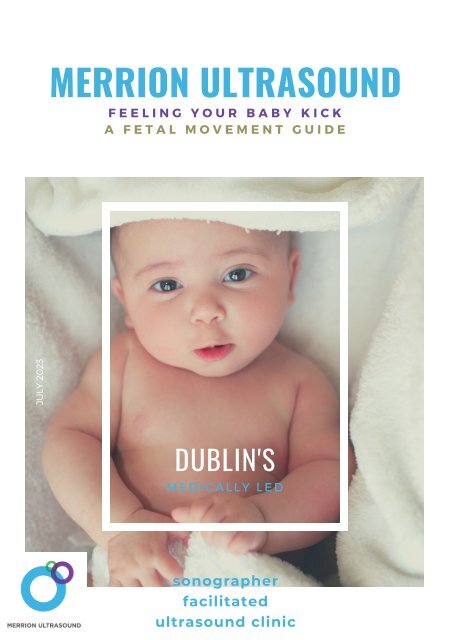Feeling Your Baby Kick-A Fetal Movement Guide
Are you pregnant and concerned about feeling your baby's movements for the first time? This magazine about fetal movement explains what you should expect, and also features a video.
Are you pregnant and concerned about feeling your baby's movements for the first time? This magazine about fetal movement explains what you should expect, and also features a video.
You also want an ePaper? Increase the reach of your titles
YUMPU automatically turns print PDFs into web optimized ePapers that Google loves.
MERRION ULTRASOUND<br />
F E E L I N G Y O U R B A B Y K I C K<br />
A F E T A L M O V E M E N T G U I D E<br />
JULY 2023<br />
DUBLIN'S<br />
M E D I C A L L Y L E D<br />
sonographer<br />
facilitated<br />
ultrasound clinic
<strong>Feeling</strong> <strong>Your</strong> <strong>Baby</strong> <strong>Kick</strong>: A<br />
<strong>Fetal</strong> <strong>Movement</strong> <strong>Guide</strong><br />
WELCOME<br />
One of the most thrilling moments<br />
of your pregnancy is when you feel<br />
your baby move for the first time.<br />
<br />
But when we are waiting for that<br />
moment to come, it can also be<br />
nerve-wracking, as we want to<br />
experience it so much.<br />
<br />
Quickening, as it is known, can<br />
happen at different times for<br />
different women.<br />
<br />
This guide about fetal movement<br />
has been put together to reassure<br />
you of the various ways and times<br />
this experience may happen.<br />
PHONE<br />
637 4060<br />
E-MAIL<br />
info@merrionultrasound.ie<br />
It also includes guidelines about<br />
how to monitor your baby's<br />
movement once it has become a<br />
pretty constant factor.<br />
<br />
<br />
DISCLAIMER<br />
Please do not consider any of the<br />
information provided here as a<br />
substitute for medical advice. At all<br />
times seek medical advice directly<br />
with your own doctor and medical<br />
team.<br />
<br />
WEBSITE<br />
merrionultrasound.ie
EXCITING MOMENTS<br />
Exciting Pregnancy Moments<br />
During pregnancy one of the most exciting moments is when you feel your baby<br />
kicking for the first time. These little first flutters can be reassuring, while also<br />
helping you to feel even closer to your baby, as he/she grows inside.<br />
Butterflies or Twitches....<br />
These movements can be quite sub- tle early on, feeling like butterflies, tumbling<br />
motions or even nervous twitches. Especially if it is your first pregnancy, it can be<br />
challenging to distinguish your baby's kicks from other internal motions,<br />
including hunger pangs and gas.
QUICKENING<br />
Quickening<br />
These first moves of your baby are known as quickening. There is quite a wide<br />
timescale as to when you can expect to feel quickening, and it can happen<br />
anywhere from between 14 to 26 weeks, although the average can be from weeks<br />
18 to 22.<br />
If it's your first pregnancy, it isn't uncommon to have to wait longer and it may<br />
even be around week 25 when you feel those first movements.
24-25 WEEKS FIRST PREGNANCY<br />
Also, the position of your placenta can play an important role in the timing of<br />
this, and for example, if it is an anterior placenta, movement may be muffled,<br />
making you wait longer.<br />
On a second pregnancy, there are some women who can feel quickening as early<br />
on as 13 weeks.<br />
However, the most common time to feel quickening is during month five. Firsttime<br />
mothers often wait until weeks 24-25 to recognise quickening.
MOST LIKELY TIMES<br />
Quiet Times<br />
You are more likely to feel fetal movement at quieter times, such as when you are<br />
sitting or lying down. Quieter times, like settling down for the night, normally<br />
mean that you are going to be more in tune with your body and therefore<br />
naturally more aware of the baby's movements.<br />
Alternating & Blood Sugar<br />
<strong>Movement</strong>s occur at certain times because baby is alternating between sleep<br />
and alertness. Often babies can be at their most active between 9 pm at night<br />
and 1 o'clock in the morning. The reason for this is be- cause of the changes that<br />
are happening in your blood sugar levels.
MOST LIKELY TIMES<br />
Adrenaline<br />
<strong>Baby</strong> can also respond to your blood sugar after you've had a snack or meal. Also<br />
if you feel nervous for some reason, the adrenaline that your body produces can<br />
have a similar effect, giving a boost of energy to your baby.<br />
Touch & Sound<br />
<strong>Baby</strong> can respond to touch and sounds, so that if you snuggle up to your partner,<br />
baby may even kick him in the back. Or perhaps try some music.
ALL BABIES ARE INDIVIDUALS<br />
All Babies Are Individuals<br />
Each baby is an individual, so try not to stress too much about comparing your<br />
baby's movements with those of any pregnant friends.<br />
Sometimes quickening is as difficult to describe as it is to recognise, but once you<br />
are sure of what it is, it's one of the most thrilling parts of pregnancy.<br />
Many Different <strong>Feeling</strong>s<br />
It may feel like a nudge, a little flutter, a growing hunger pang, a twitch, a muscle<br />
spasm, the feeling of butterflies like when you feel nervous, a tumbling motion, or<br />
even like a bubble bursting.
FREQUENCY<br />
Once In A While<br />
Earlier in pregnancy it's most likely that you will only feel baby's movement as a<br />
few flutters every once in a while. <strong>Kick</strong>s should be more frequent and stronger by<br />
the end of your second trimester.<br />
15-20 Per Day<br />
Once movement has been regularly established, the average number of kicks is<br />
around 15-20 per day, including all movements, not only bladder kicks.<br />
However, in the third trimester, some studies have shown that babies can move<br />
as much as up to 30 times every hour.
WHY DO BABIES KICK?<br />
A Response To Environment<br />
Babies move and kick often in response to something happening in their<br />
environment.<br />
<strong>Baby</strong> may be responding to too much light, noise and in some instances, strong<br />
foods.<br />
Stretching & Relaxation<br />
Just like us, babies need to move and stretch for relaxation. This means that if<br />
you are moving, this can be relaxing for baby.
EXERCISES<br />
Quieter Babies<br />
This study showed that women who participate in relaxing exercises, such as Qi<br />
Gong, yoga, and meditation, may find that their babies are quieter. This makes<br />
sense in terms of Mum's relaxing movement doing some of the work for the<br />
baby, in a way.<br />
<strong>Guide</strong>d Imagery Exercises<br />
Also, women who took part in that same study experienced reduced fetal<br />
movements when they under-took guided imagery relaxation exercises. The<br />
exercises lowered their respiration rates, heart rates, and skin conductance,<br />
which in turn lowered their babies' heart rates. This led to decreased fetal<br />
movements.
AVERAGE TIME GUIDELINE*<br />
Week 12<br />
<strong>Movement</strong> should have started, but it is very unusual to feel anything as baby is<br />
too small.<br />
Week 16<br />
A small number of women may feel butterfly-type flutters, which could be either<br />
gas or baby movements.<br />
Week 20<br />
<strong>Baby</strong> may be developed enough for some women to be confident that it is<br />
quickening that they are feeling (but not all women, and especially those on a<br />
first pregnancy)
AVERAGE TIME GUIDELINE*<br />
Week 24<br />
<strong>Baby</strong>'s movements are more established. Some women may feel little twitches<br />
that could be baby hiccups.<br />
Week 28<br />
<strong>Baby</strong> is on the move a good bit now, to the extent that some of the jabs and<br />
kicks could be making a bit of an impact on you.<br />
Week 36<br />
Now your uterus is quite crowded, so this means that you can expect a little bit of<br />
a slowdown in baby's movements.<br />
*Please take into account that both you and your baby are individuals
SHOULD I MONITOR MY BABY'S<br />
MOVEMENTS?<br />
Around Week 28<br />
When your baby's movements seem to be well established, which often happens<br />
around week 28, some doctors recommend keeping a diary of these jabs,<br />
punches, and kicks. Currently, there isn't actual scientific evidence to show<br />
whether keeping track of the movements is a proper indicator of how baby is<br />
doing.<br />
Recommended<br />
However many women like to do it, as it comes naturally to them to be in tune<br />
with baby, and many healthcare providers recommend it also.
SHOULD I MONITOR MY BABY'S<br />
MOVEMENTS?<br />
How Is <strong>Your</strong> Routine?<br />
Depending on how your schedule is, you can spend some time monitoring your<br />
baby's movements either once or twice a day. If you can manage to fit two times<br />
into your schedule, then use both of these suggestions below. If not just go for<br />
the second option, when movement should be busier.<br />
Mornings<br />
If you are able to set aside some time in the morning, even though move- ments<br />
tend to be less during this time of the day, then you can evaluate the average<br />
number of movements within an hour. If you stick to the same hour each<br />
morning, then you know what average amount of movements ap- proximately to<br />
expect.
HOW TO MONITOR BABY'S<br />
MOVEMENTS<br />
After Meal Times<br />
A convenient and logical method is to choose a time when your baby is normally<br />
more active, which could be just after you've had lunch or dinner.<br />
So after your meal put yourself in a comfortable position, either lying on your side<br />
or relaxing on a comfortable chair, and check if the fetal movements are as<br />
normal.
HOW TO MONITOR BABY'S<br />
MOVEMENTS<br />
Normal movements<br />
It is no longer recommended to count your baby's movements exactly. Instead,<br />
you can observe if the movements are regular and in tune with the baby's recent<br />
patterns of movement.<br />
If the pattern has reduced or you are not feeling any movement, please follow<br />
these guidelines.
WHAT TO DO IF THE PATTERN<br />
CHANGES<br />
Sit or lie still for a period of time, and drink a glass of cold water, which<br />
theoretically may stimulate baby to move. You can also rub your tummy and talk<br />
to your baby.<br />
Evaluation Is Important<br />
The absence of activity doesn't immediately mean that there is something wrong,<br />
however, it is something that needs to be evaluated quickly.<br />
Please be sure to contact your healthcare provider if you feel concerned at all.<br />
Don't be worried about wasting their time, as women sometimes we think like<br />
this. Contact your healthcare provider to get checked.
MERRION<br />
ULTRASOUND<br />
FEELING YOUR BABY<br />
KICK: A FETAL<br />
MOVEMENT GUIDE<br />
https://merrionultrasound.ie/

















